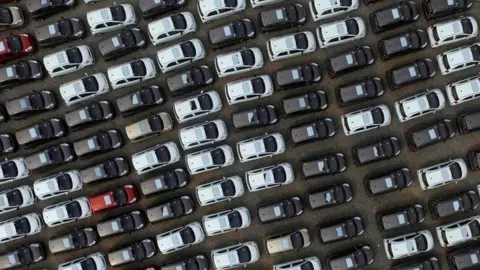Climate emissions target 'likely to be missed' in Wales
 Reuters
ReutersA target to reduce greenhouse gas emissions by 40% in Wales by 2020 is likely to be missed, government advisers have warned.
The latest Committee on Climate Change (CCC) progress report shows emissions have actually risen by 0.5% per year on average between 2009 and 2015.
However, there was a fall of 1.2% in 2015, due to a reduction in emissions from industry.
The Welsh Government said it recognised "further action is needed".
By contrast, Scotland is on track to meet its own 2020 target.
Wales has a non-statutory target to reduce greenhouse gas emissions by 40% from 1990 levels by 2020.
In 2015, the CCC - which advises the UK and devolved governments - found emissions were 20% lower than in 1990, compared to 38% for the UK as a whole.
Transport emissions have risen for two years in a row in Wales, and in contrast to the UK, the Welsh power sector's emissions stayed flat in 2015.
"Urgent action" is needed, the report argues, in areas where devolved nations have sufficient power to act.
It suggests addressing failures to meet tree-planting targets, and further incentives to improve energy efficiency and heating of buildings and in promoting electric vehicles.
Where policy areas are reserved, "it is important to work with the UK Government to ensure that the overall framework is strong enough to drive the necessary emission reductions".
However, good progress is being made in the areas of renewable energy and recycling, the report says.
A target to produce 7TWh of electricity from renewables in Wales by 2020 is likely to be met, while Wales is leading the UK in terms of recycling rates.
Wales accounted for 9% of UK emissions in 2015.
It works out at around 14.7 tonnes of carbon dioxide per person in Wales - slightly more than 10 years ago; the figure for the UK as a whole is around 7 tonnes and in Scotland it is around 8.4 tonnes per person.
Jessica McQuade, policy officer with environmental organisation WWF Cymru, said they were "very frustrated at the lack of progress, a feeling we're sure is felt by many other organisations and people across Wales who want climate change tackled".
She added: "Welsh Government has known for several years that we must accelerate action on emission reduction.
"But today's figures show again that incentives and programmes in Wales are not having the scale of impact needed."
WWF said it wanted to see plans to deliver in areas like renewable heat and reducing agriculture emissions.
Haf Elgar, acting director of Friends of the Earth Cymru said the report "clearly shows that we need to urgently up our game now".
"We're disappointed that emissions in Wales have flat-lined in recent years, with variations mainly due to external factors rather than government action," she said.
"We've now got the framework to deal with this in Wales with the Environment Act but need to set ambitious targets to reduce our emissions in line with the Paris Agreement."
The CCC is meeting the Welsh Government next week, with minsters due to take advice before setting the levels of its first two carbon budgets in 2018.
A Welsh Government spokesperson welcomed the report, highlighting Wales' record on leading the way with the highest recycling rates across the UK.
"Wales has a proportionately high share of the UK's electricity generation and heavy industry and is a net exporter of energy," said the spokesperson.
"Electricity produced in Wales feeds into the national grid and is consumed by homes and businesses across the UK. Taking these energy exports into account, emissions based on Wales' end-use consumption of energy have reduced significantly since 1990.
"We recognise further action is needed and our Environment Act sets us at least an 80% long term reduction by 2050."
